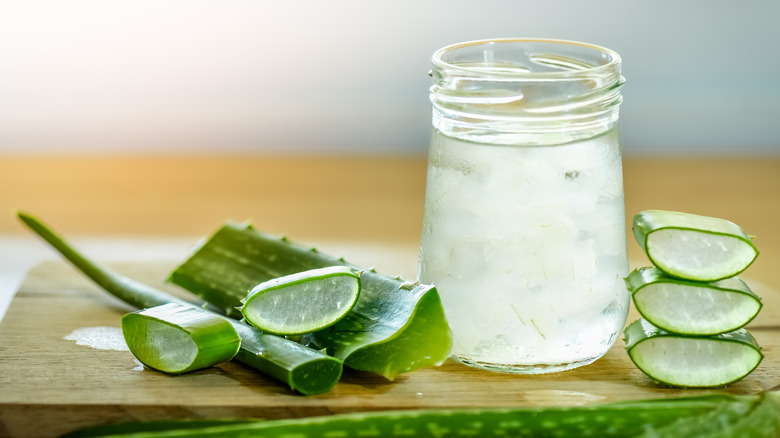Drink This Hydrating Beverage For Easier Pooping
Come morning, when you have a long list of things to get started on your to-do list, the last thing you want to do is sit on your toilet seat waiting for that seemingly elusive bowel movement. Perhaps this is why social media is obsessed with poop habits. From TikTok viral hacks to poop in just minutes to foods that help relieve constipation, there's no shortage of advice.
Among the latter category, you may have commonly heard of bananas, coffee, and even avocados. But there's a beverage that's all the rage in health stores that can also help you out when you're "stuck" in the bathroom — aloe vera juice. We're not referring to the gel-like substance you get from this plant that's native to the Arabian peninsula. Aloe vera-based gels, moisturizers, face washes, etc. have existed in the skincare industry for quite some time now. The gel is known to offer relief in cases of sunburn, cuts, and abrasions when applied topically.
What relieves constipation, however, is aloe vera juice. It can contain the gel (diluted in water to make it more palatable) or it could have the latex or green leaf parts of the aloe vera plant. Either way, what's sold in many health food stores is of diluted water-like consistency, with a pungent and bitter taste.
Aloe vera juice contains laxative properties
The laxative property of this cactus-like plant lies in a compound called "anthraquinone," which is said to exist in the outer layers of aloe vera. Anthraquinones can also be found in other plants like the rhubarb root, senna leaf and pod, cascara, and buckhorn. More specifically, aloins A and B, which belong to a class of anthrones in aloe vera, are thought to be responsible for getting things moving in the bathroom, per a 2023 study published in the Journal of the Science of Food and Agriculture (JSFA) Reports. In fact, aloe vera juice was found to relieve symptoms of irritable bowel syndrome, in a 2018 study published in the Journal of Neurogastroenterology and Motility.
According to a gastroenterologist and clinical assistant professor of medicine at the University of Pittsburgh, Dr. Elizabeth Blaney (via CNN Health), for someone trying the juice for the first time, you may want to start with two ounces and build up to eight. Despite aloe vera traditionally being used as a laxative, the U.S. Food and Drug Administration (FDA) has only approved it as a natural food flavoring and to be consumed as a juice (via GovInfo). There is no official approval for its use as a laxative yet.
In addition to being touted as a genius way to get yourself to poop instantly, aloe vera juice has other potential health benefits, most of which require more research. Among these benefits are the plant's rich supply of vitamin C, its hydration properties, and its possible influence in regulating blood sugar levels and calming gingival inflammation. However, it's not all good news.
Safety concerns with drinking aloe vera juice
Higher doses of aloe vera juice are known to cause diarrhea and cramps. Additionally, the International Agency for Research on Cancer classified aloe vera whole leaf extract as a class 2B carcinogen, a possible risk factor for cancer (via Cancer Research UK). The concern is with the same properties that offer laxative benefits in this plant — anthraquinones.
A 2013 study done on rats and published in Food and Chemical Toxicology found a link between high levels of anthraquinone in non-purified whole leaf aloe vera extract and increased incidence and severity of diarrhea, gland-like growth in the large intestine, and cancer of the epithelial tissue. Although there's no evidence in humans, emeritus professor of toxicology at Imperial College London Alan Boobis shared (via Daily Mail) that there is reason enough to be cautious.
"It's a rare type of tumour they found in that 2013 study, which means they were pretty sure it was directly related to the substance the rats were consuming ... There is also evidence from other studies that anthraquinones cause damage to the DNA in cells that could lead to cancer," explained the professor.
So, should you be consuming the juice to ease poop worries in the morning? If you're having constipation regularly, you should get checked out by a health professional. That being said, the study pointed toward high levels of anthraquinone. Plus class 2B carcinogens also contain foods like Korean kimchi. Perhaps, you can run aloe vera juice as a regular poop health drink by your doctor before adding this beverage to your diet.


